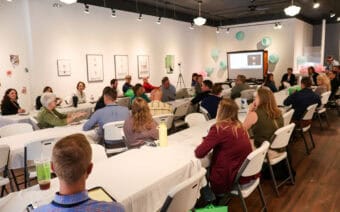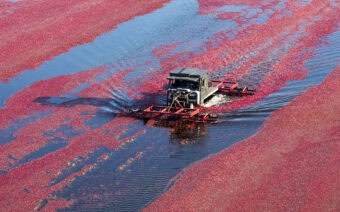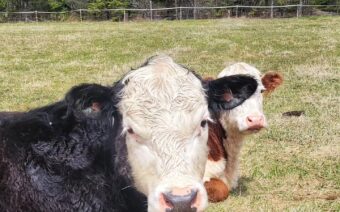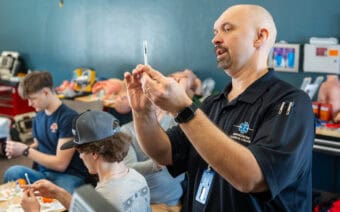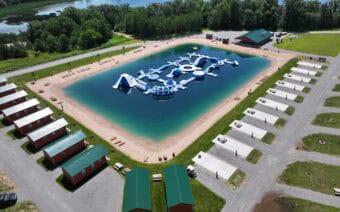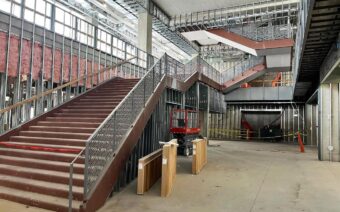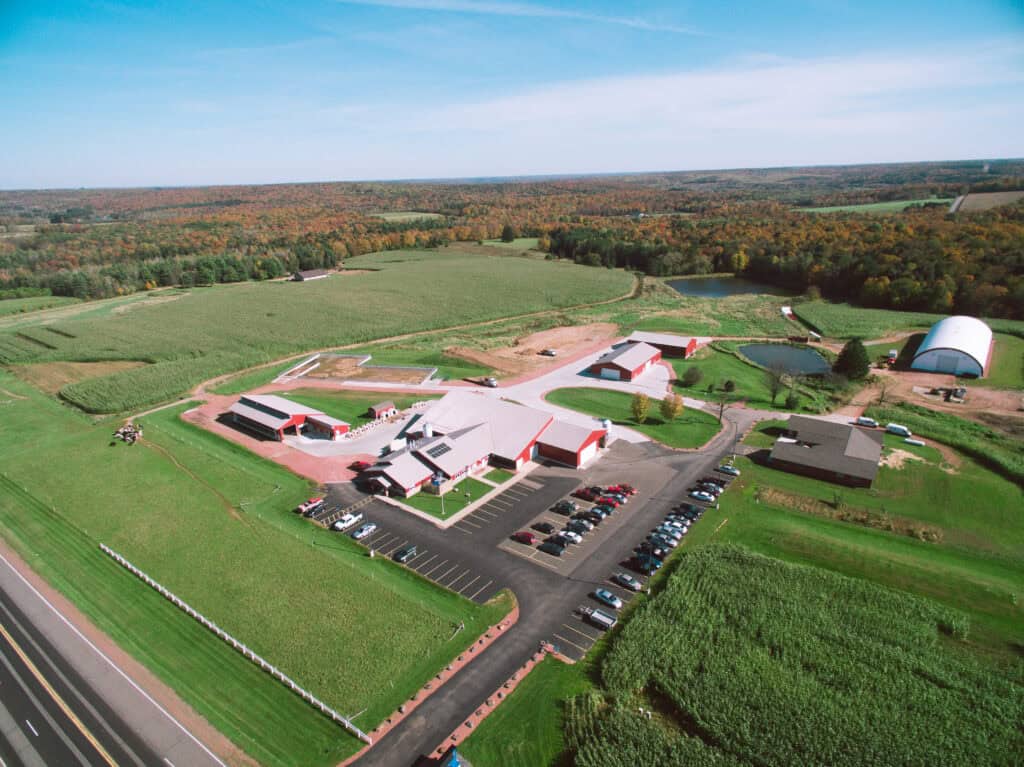
August 5, 2024
WAUSAU – Most two- and four-year technical colleges and universities offer a wide-range of agricultural programs, but Greg Cisewski – dean of Northcentral Technical College’s (NTC) School of Agricultural Sciences, Utilities and Transportation – said the college offers something above and beyond.
Cisewski said NTC’s Agriculture Center of Excellence – the school’s 120-acre, fully operational dairy farm – provides opportunities for students to not only milk and care for the farm’s herd of dairy cows, but also grow all of their own crops for the animals.
The agriculture center, he said, is the only working dairy farm and learning laboratory in the Wisconsin Technical College System.
Though students at other schools may intern on local farms, at NTC, Cisewski said classes are held right at the farm – which is located about four miles from the school’s Wausau campus.
Cisewski said the decision for NTC to operate its own farm came in 2011 when leadership determined that in order to deliver wide-scale agriculture training, a school-owned farm was the best way to accomplish that.
“The idea here is we are creating some of the best ways to learn to create crops and produce dairy, and to take care of (our animals) and our environment,” he said. “We are to be the example that our producers can come to and learn from.”
Cisewski said NTC encourages producers/farmers to come to the farm and learn what “we are doing and see how it works for us.”
“Maybe they can take some of these tactics or principles back to their own farm and help them increase their profits and increase their sustainability (efforts) of not only their land, but of the farm and their lifestyle,” he said.
Various areas of farming
Thanks to its collaboration with agriculture, government and education partners, Cisewski said the Agriculture Center of Excellence is able to provide the knowledge and skills needed to excel in the management of a herd, nutrition, crops, equipment, facilities and agri-business.
The center, he said, also features an apple orchard, pollinator plot, greenhouse and grow pod.
Cisewski said all of these resources serve as instructional aids for both learners and visitors.

He said the college also continues to explore alternative sustainable energy services that could be implemented at the center in the future.
Students utilizing the facility, Cisewski said, are exposed to the latest agriculture equipment and precision farming technology – allowing them to take full advantage of the 120 acres of farmland to plant peas, oats, alfalfa, red clover, grass, turnips, radishes and corn, as well as larger crops unique to areas like North Central Wisconsin, like ginseng and cranberries.
“Students are responsible for everything from managing the soil to keep it healthy enough to grow a crop, to keeping the soil in the field where it belongs,” he said. “(They) do pest and disease management and weed management, and then the harvest and utilization for sale of that crop.”
Besides its own farmland, Cisewski said the school rents 100-150 acres from neighboring farmers every year to ensure they have enough crops for all its needs.
Dairy science program students, Cisewski said, are responsible for everything related to growing and managing a dairy herd.
He said the school’s farm has both lactating and dry Holsteins on it, but students are exposed to several types of dairy animals, including goats and different breeds of milking cows.
“Students learn how to be sure they’re feeding the animals with the proper nutrients, balancing their diet and feeding them the right things at the right times,” he said. “So, when they have their calves and start milking, they’re as healthy as they can possibly be, not only for the long-term survival of the cow and calf, but also so they can be producing a lot of milk.”
All the cows have activity collars on them, which Cisewski said measures things like how much the cows are eating; what their eating habits are, their rumination, when they’re in heat or when they’re not feeling well.
Milking of the cows is done by a robot, something Cisewski said is used on more and more of today’s farms.
Using a treat as an incentive, he said the cows are trained to enter the robot at the appropriate times – with some cows being milked as often as four or five times a day.
“The cows are trained to know when they have milk and how to get rid of the milk,” he said. “They enter the robot, which is programmed to know when the cows get milked and how much they should be milking.”
Cisewski said the robot gathers a lot of its information from the cows’ activity collars.
“The cows enter the milking robot, stand on a scale to get weighed, and a laser-guidance system attaches milking cups to the teats,” he said. “The cups disconnect from the cow at the designated time, the teats are sterilized and they leave the robot.”
Cisewski said NTC’s herd is averaging about 100 pounds of milk per cow per day.
“We study all aspects of a cow’s life from the moment it’s born to how to properly take care of them so that they have long, healthy, enjoyable lives,” he said. “We start building the data on a cow long before the animal is bred or before she has her first calf.”
Cisewski said students also track cows with the activity collars.
Between activity collars and the milking robot, he said students and farmers are able to spend more time caring for the cows or doing other chores on the farm.
Before robots, he said a farmer may have been in the field or baling hay and they’d have to stop to go milk the cows.
Today, Cisewski said, if there’s a problem, the system can call or text the farmer.
In addition to receiving a pelleted feed in the robotic milking machine, Cisewski said the school’s cows are fed a customized mixed ration consisting of corn silage, haylage, dry hay, straw, vitamins and minerals by the robotic feeder.
Those taking a tour of the center, he said, are able to watch the robotic milker in operation as cows are being milked.
The milk produced by the school’s herd, Cisewski said, goes to a local cheese factory for processing.

The center has also integrated technology into its field spraying processes.
Instead of spraying fields with a tractor, Cisewski said the center uses drones.
Using a drone camera, he said, operators can identify weeds, then send in a different drone to spray the fields.
“All this equipment is autonomous,” he said. “Even tractors today are almost able to drive themselves through the field. As our economy continues to grow, we’re seeing more and more of a need for these types of tools to help our people produce more of whatever it is they’re producing, with less time and less people.”
These types of technologies, Cisewski said, allow the farming industry to keep producing.
“We’re trying to reduce the input and increase our yield so that we can make it more profitable for our farmers to farm,” he said. “As a result we’ll be able to keep more of them in business.”
Garden-to-market specialist program
NTC’s one-year garden-to-market specialist course, Cisewski said, is designed for anyone interested in market gardening and fruit and vegetable production in a variety of agricultural settings.
Students develop skills to start their own enterprises growing produce and other agricultural products, he said, to sell, either as a business or a smaller income-producing hobby.
Hands-on and classroom training, Cisewski said, are offered in both a hoop house and greenhouse lab setting.
Though both structures are somewhat similar, he said a hoop house is often a less permanent structure – and is covered with plastic in order to extend the growing season.
“We’re able to plant the crop earlier in the year, harvest it, then replant another crop,” he said. “So, we’re able to grow two crops on the same space of soil.”
Cisewski said some of the crops grown on the school’s farm are sold locally and the money earned is put back into the program.
“It gives the student experience in selling what they’re growing, ensuring they have a competitive product and pricing,” he said.
Other crops grown on the farm, Cisewski said, are used in the school’s culinary program or at the school cafeteria.
And those that go unused, he said, are given to local food pantries.
Cisewski said the center also utilizes a Grow Pod – a 8’x20’-long retired shipping container outfitted with LED lights and climate-controlled so crops can be grown year-round.
“They’re grown hydroponically so all the nutrients are put into the water that is filtered through the plants’ root systems,” he said. “There’s no soil in there whatsoever, so there’s no pests in there and no mold that comes from the soil. The crops can be harvested year-round. A lot of places are stacking these containers next to each other and producing crops year-round for lots of people.”
Veterinary technician program
Cisewski said NTC’s veterinary technician program certifies graduates to work alongside veterinarians and be able to do things such as assist with surgeries, prep animals for exams or procedures and doing other very important tasks that help the veterinarian be able to see more patients, faster.
At a time when the U.S. is short of both veterinarians and vet techs, Cisewski said this program is critical.
Students, he said, get an opportunity to learn on small animals, like dogs or cats, as well as large farm animals, as they provide care for the school’s farm animals.
Agronomy and agri-business
Cisewski said NTC’s agronomy program looks at the different crops grown in Wisconsin and teaches students to understand the basic principles of crop production, as well as perform soil sampling and utilize a nutrient management plan.
Graduates from this program, he said, may get jobs with cooperatives (co-ops) or feed companies and work with the farmers when they run into problems with their crops, soil, a loss in their profit, etc.

“They’re looking to save the farmer from having to put things on the field that aren’t necessary and just give the crops what they need, when they need it so we can keep all the nutrients on the field and don’t have things coming off the field that shouldn’t,” he said.
Cisewski said cooperatives or feed companies often own specialty pieces of equipment that their agronomist will take to a farm to help the farmer so he or she doesn’t have to purchase their own equipment that may only get used once a year.
“They move from producer to producer at the time of year it’s needed,” he said.
NTC’s agri-business program, Cisewski said, is designed for students interested in an agriculture career but, for various reasons, aren’t interested in direct production agriculture.
In addition to agriculture, he said students are taught business principles for positions as an economist or manager making decisions and helping farmers manage their businesses.
Embracing AI, other technology
Cisewski said NTC not only welcomes, but embraces the use of artificial intelligence (AI) and other technology in farming, both today and in the future.
In support of these efforts, Cisewski said he serves on the Governor’s AI Task Force.
“We’re really seeing a technological boom in the equipment that’s out there, and we’re trying to make sure our students are ready for that,” he said. “The college has an initiative where we’re committing funds and resources and working with industry leaders to make sure our students are learning with the latest and greatest techniques, technology and pieces of equipment.”
Cisewski said NTC strives to be on the leading edge of the technology game.
“We definitely want to be that resource for our community to come see the latest and greatest, and to train our students for the future,” he said.
For more on NTC’s Agriculture Center of Excellence, visit ntc.edu.
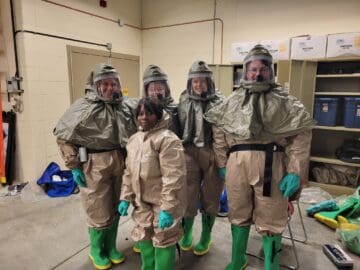 Built on safety, powered by people
Built on safety, powered by people La Crosse-based grazing board business owner wins 2024 Entrepreneur of the Year
La Crosse-based grazing board business owner wins 2024 Entrepreneur of the Year


